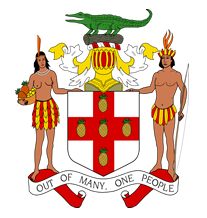The island - discovered by Christopher COLUMBUS in 1494 - was settled by the Spanish early in the 16th century. The native Taino, who had inhabited Jamaica for centuries, were gradually exterminated and replaced by African slaves. England seized the island in 1655 and established a plantation economy based on sugar, cocoa, and coffee. The abolition of slavery in 1834 freed a quarter million slaves, many of whom became small farmers. Jamaica gradually increased its independence from Britain. In 1958 it joined other British Caribbean colonies in forming the Federation of the West Indies. Jamaica gained full independence when it withdrew from the Federation in 1962. Deteriorating economic conditions during the 1970s led to recurrent violence as rival gangs affiliated with the major political parties evolved into powerful organized crime networks involved in international drug smuggling and money laundering. Violent crime, drug trafficking, and poverty pose significant challenges to the government today. Nonetheless, many rural and resort areas remain relatively safe and contribute substantially to the economy.
Jamaica is a parliamentary democracy under a constitutional monarchy and part of the Commonwealth realm.
Members:
Resources
Displaying 51 - 55 of 77Kingston and St. Andrew Corporation (Removal of Sand and Gravel) Regulations, 1956.
These Regulations provide rules for the removal of sand and gravel in the Corporate Area of the Kingston and St. Andrew Corporation. Removal of sand, gravel or other material from watercourses or river beds requires a licence from the Council of the Corporation to be granted in accordance with these Regulations.
Implements: Kingston and St. Andrew Corporation Act. (2010)
Farm Loans Regulations, 1965.
These Regulations implement provisions of the Farm Loans Act regarding restrictions on loans, maximum time of repayment, default in repayment, etc. The Regulations also prescribe various forms for purposes of the Act.
Implements: Farm Loans Act. (1976)
Agricultural Small Holdings Regulations.
These Regulations define and list "prescribed trees" and "economic trees" for purposes of the Agricultural Small Holdings Act. For the purposes of section 8 of the Act, the areas specified in the Second Schedule shall be the areas in respect of which a landlord may reserve, in a rice tenancy contract, the exclusive right to graze cattle upon the holding for the period between the reaping of one crop of rice and the preparation of the land for planting the next crop.
Implements: Agricultural Small Holdings Act. (1997)
Land Valuation Act.
This Act provides rules for the valuation of public and private land and all trees standing on it by the Commissioner of Land Valuations and makes provision with respect to matters related to valuation such as access to land or buildings, appeal against decisions and the division of Jamaica into valuation districts. The Commissioner shall, in each district, make a valuation of the unimproved and improved value of every parcel of land.
Agricultural Small Holdings Act.
This Act makes rules relative to contracts of tenancy of “small holdings” i.e. any parcel of land intended for cultivation or pasturage consisting of not less than one acre nor more than ten acres held under a contract of tenancy. The Act also makes provision for the establishment of Valuation Boards.The Act establishes conditions and criteria for tenancy contracts between landlords and tenants of agricultural small holdings. No crop-sharing clauses may be included in the tenancy contract.


